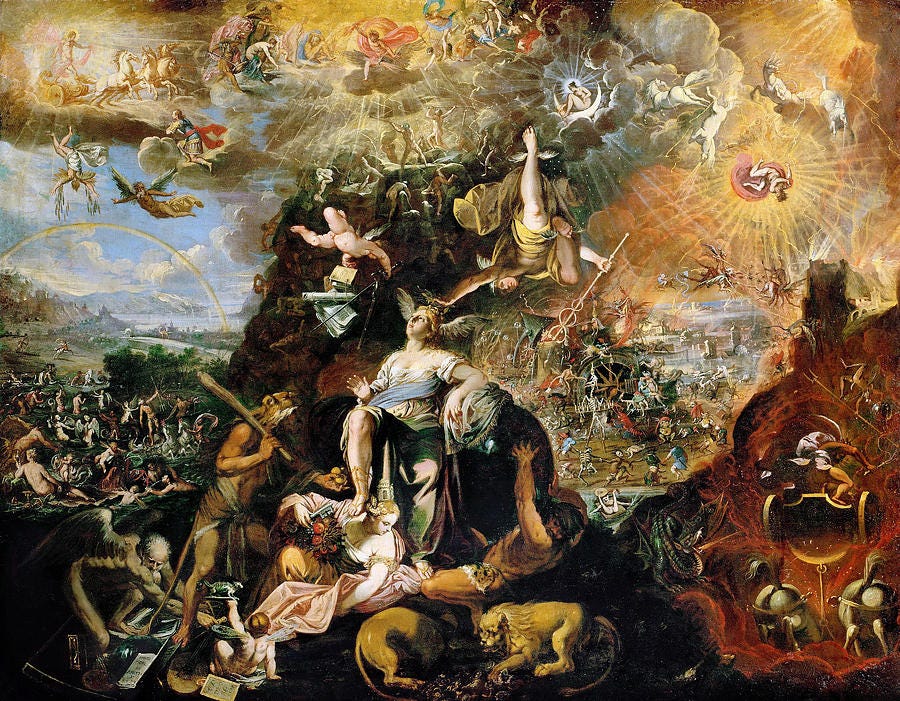Kanye, Trump, and the Right's Antisemitic Zionism
Sentiments like theirs have led to Jewish deaths before. Is it any wonder we object to them?
Edited by David Swanson
It’s a rare thing when explicit antisemitism makes big headlines. Which isn’t to say that prejudice against Jews, and its attendant conspiracy theories, aren’t at an ever-present simmer in the soup of the American consciousness. But it usually takes something significant—a synagogue massacre, or very rich and famous people spouting ancient vitriol—for this oldest and most banal of hatreds to push its way onto the front page.
This is such a time. Between Kanye West’s weeks-long deluge of antisemitic diatribes, and some acrid commentary from Donald Trump that earned a White House rebuke for insulting Jews, it’s been a time of throbbing temples amongst America’s Jewish population. This week, all eyes have been on Ye—whose Gap collaboration, Gap x Yeezy, was released to a collective shrug, and presumably a run on $240 Gap sweatshirts, while he went on to rant with ever-increasing vitriol about Jews conspiring to make him appear unstable. Today, it was announced that Adidas had cut ties with him; yesterday, he was dropped by his agents at CAA.
I addressed Kanye’s antisemitism in more depth over at Business Insider, but here I wanted to go back and dig a bit deeper into Trump’s comments. One of the advantages of publishing my own newsletter is that I get to write about what I think people should know about. And one of the things I think about a lot—for self-preservation reasons—is how a particularly odious swath of evangelicals in this country are Real Weird About the Jews. I mean … Real Weird. I mean … twist-yourself-into-pretzels, crazy-eyes, run-infomercials-about-Israel weird. And it’s all, in the end, about the apocalypse.
The Sword and the Sandwich is a newsletter about serious extremism and equally serious sandwiches. Please consider supporting this work with a paid subscription:
The apocalypse is a subject of great anticipation for many of America’s Christian fundamentalists, who are seemingly all hopped-up on a fancy-sounding ideology called “premillennial dispensationalism,” which is short for “they believe Jesus is going to come and literally create a thousand-year reign on earth, and it’s happening any minute now.” This ideology is still relatively new, really only taking root in the mid-1800s, in upstate New York—a place and time of such singular religious fervor that it changed the face of American religion forever. Mormonism and Seventh Day Adventism also began in the region, where people dreamed so fiercely of the world burned with their faith.
Out of this effulgence of fervor, a real bone-gnawing fixation on the End Times suffused American religion, which exists to this day. Just ask gun-toting Congresswoman Lauren Boebert, who told an Oct. 19 Tennessee Republican Party dinner that the end times were nigh, and it was awesome. “I believe that many of us in this room believe that we are in the last of the last days and that’s not a time to complain, that’s not a time to grumble, to be dismayed, to be disheartened, but a time to rejoice,” she told them, and they applauded. “You get to be a part of ushering in the second coming of Jesus.”
The thing about the second coming of Jesus, as imagined by many fundamentalist evangelicals, is that, when you get down to it, it all … depends … on the Jews. The Jews in Israel in particular. That’s why Trump gave that big sloppy kiss of an encomium to evangelical Christian Zionists recently, noting how grateful they all are about his support for Israel.
While Trump’s rhetoric, always reminiscent of a third-tier Scorsese wiseguy, has a gangsterish, threatening aura, the dynamic he describes speaks to a fundamental split between the Jews of the diaspora and Christian Zionism, an ideology that has long colored attitudes towards Israel and the Zionist political project—particulary in America, where Christianity has a history of flirting with ecstatic anticipation of the apocalypse.
Eschatology—with a particular focus on the Book of Revelation—has been front and center on the Evangelical right for quite a long time. In the past few decades, popular works of end-times prophecy like Hal Linsday’s The Late, Great Planet Earth (1970) and the more recent, bestselling Left Behind series dramatizing the Rapture (available in novel, audiobook, graphic-novel, and Kirk Cameron straight-to-VHS film format) have mainstreamed the esoterica of the end of the world.

Key to this view of the Apocalypse—the Second Coming and its attendant end to history—is a mass return of the Jews to Israel. This prophesied exodus will presage Jesus’ return to conquer Israel’s enemies—and convert the Jews. In the fire and blood of Tribulation, most Jews will be slaughtered, except the blessed remnant who convert to Christianity. Or, as former Liberty University professor Thomas Ice put it, “One of the major Divine purposes for the tribulation in relation to Israel is the conversion of the Jewish remnant to faith in Jesus as their Messiah.” With friends like these—friends whose support is contingent on a violent fantasy of your destruction—who needs enemies?
The fact that Jews in the Diaspora have an annoying tendency to relate to ourselves as more than pawns in someone else’s apocalypse—as more than Israelis in potentia, awaiting the return of Jesus with bated breath, but rather full individuals in ourselves with a centuries-long history in this country—makes us, at best, an inconvenience to Evangelicals; at worst, an active obstacle to be overcome.
The evangelical right makes something of a fetish of Jews—adopting our imagery freely, holding Passover seders at churches and bringing ram’s horns to Trump-supporting “Jericho marches”—but their smiles are shark-toothed, red with the blood of Armageddon. This ideology has its own roots in classical antisemitism: the trope of the two-faced Jew—loyal principally to international Jewry rather than being a full-hearted citizen of any nation—is readily expressed in the conception of Jews as pieces to be shifted on an end-days chessboard, ready to skip across the map at any time.
What we are, though, most of all, is a flesh and blood people, of many and various professions, a tiny minority with its own proud tradition in America, no particular desire to be heralds of the apocalypse, no clandestine pan-Jewish meetings to decide the fate of Kanye West or anyone else for that matter, and we also collectively have a headache.
If you’re going to blame someone for the unrest brewing in these United States—an unrest that has turned bloody many times over in the past half-decade, and seems at the perpetual edge of full-bore civil war—we would like you to turn elsewhere, perhaps with a view to fact, rather than prejudice. In the interim, please tune out Kanye West and Donald Trump, and anyone who seems too enthused about what they have to say on this issue (or any issue, really). It’s not a conspiracy to silence them: we just don’t feel like getting murdered today. Sentiments like theirs have led to Jewish deaths before, in thousands, and millions; is it any wonder we object to them? Anyway, we are too busy for any mass pogroms at this time; try again later, in another century, or maybe never.








Thank you, Tal. I really never expected to be looking for an exit strategy.